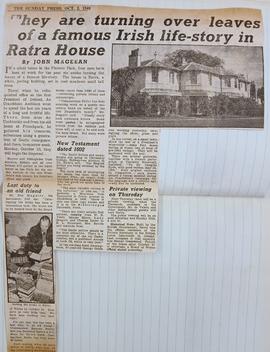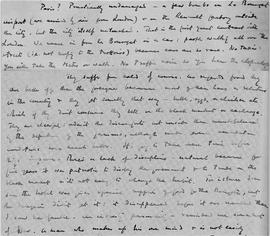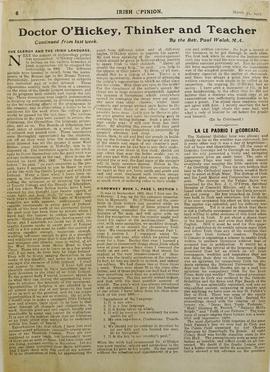Draft poetry by Daniel Laurence Kelleher (1883-1958) submitted for publication in 'The Capuchin Annual'. The file includes drafts of ‘Nietzsche’ (1924), ‘The forties of the Twentieth Century’, ‘Marie, do you remember?’, ‘Resurrection Morn’, ‘Question Mark’, ‘Travellers’ Tales’, ‘The Medallist’, ‘Loneliness’, ‘Decadence’, ‘Thistle’, ‘Return to Ireland, 1928’, ‘Sappho Spoke Our Name’, and ‘Three Thoughts for 1936’. The file also includes correspondence, draft articles, notes and newspaper articles written by Kelleher. Many of the drafts of stories are seemingly connected with Kelleher’s work for the Irish Tourist Association. Many relate to important historic personages associated with places around Ireland particularly in Dublin including Belvedere House, St. Stephen’s Green, Werburgh Street, Meath Street, Parnell Square, O’Connell Street, the Guinness Brewery and Dublin Castle. Other locations referred to include ‘Armagh City – First Impressions’ published in 'The Capuchin Annual' (1943), Limerick, Tory Island and Lough Derg. Many of the stories are written in a travelogue style and some may have been written with a view to publication in the 'Annual'. The correspondents include the Government Information Bureau, Fr. James O’Mahony OFM Cap., T.J. Kiernan, Frank Flynn, the Irish Tourist Association. The file includes the following items:
• Clipping from the 'Evening Telegraph' (2 Oct. 1915) of an article by Kelleher titled ‘The Colour of Cork’.
• Clipping of an article titled ‘A Picture of Dublin’. (1928).
• A story titled ‘Sir Kay the Senechal’.
• Draft story titled ‘Father was always like that’.
• An article titled ‘Adventures in Europe / The Great St. Bernard Monastery’.
• Letters to Kelleher from Edward J. Phelan (1888-1967), the Director-General of the International Labour Organisation from 1941-8. Phelan’s letters date from 19 Feb. 1927 to 8 Jan. 1956. One of the letters (24 Dec. 1945) gives an eye-witness account of conditions in post-war Paris. See image of letter extract which reads:
‘Paris? Practically undamaged – a few bombs on Le Bourget airport (we arrived by air from London) and on the Renault factory outside the city, but the city itself untouched. That is the first great contrast with London. We came in from Le Bourget in a car: people walking all over the streets (i.e. not keeping to the trottoirs) because cars are so rare. No taxis: you either take the metro or walk. No traffic noise so you hear the clop-clop.
They suffer from cold of course. As regards food they are better off than the foreigner because most of them have a relative in the country and they get something that way – butter, eggs, a chicken etc which if they don’t consume they sell on the black market in exchange. They are cheerful; admit the discomforts but consider them counterbalanced by the departure of the Germans, although under German occupation conditions were much better. It’s going to take some time before things improve. There’s a lack of discipline – natural because for five years it was [a] patriotic duty to disobey the government and to trade on the black market and its not easy to change the habit. For instance I am sure the hotel was given special supplies of food for the delegates, but the delegates didn’t get it; it disappeared before it ever reached them. I saw de Gaulle. An interesting personality – reminded me somewhat of Dev [Éamon de Valera]: a man who makes up his own mind and is not easily [shifted when he has]'.





